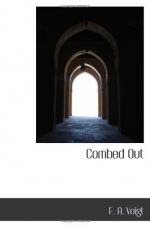The “case” lying on the end table had been in the C.C.S. for several days. He had undergone operation as soon as he arrived. At that time he only had a small surface-wound below the knee, but it was slightly gangrenous. The next day the gas-gangrene appeared above the knee-joint. The wound was excised a second time. But soon afterwards gangrene appeared again, still higher up, and a third operation was necessary. And now the wound stretched from below the knee almost as far as the hip. It was shallow, but as broad as a hand and of a greyish-green colour. The man breathed feebly and his eyes were turned up so that only the whites were visible. He received gas. Amputation was impossible for the gangrene had reached too far. The wound was excised, but the surgeon said: “I’m afraid he’s done for, poor fellow.” The man’s breathing became almost imperceptible. The oxygen cylinder was sent for, the rubber tube was pushed in between the blue lips, and the gas rushed through. In a few seconds he had revived and gave loud and regular snorts, jerking back his head and shaking his body with each ingoing breath. He was taken back to the ward and put back to bed. He began to talk volubly about his wife and children. Within half an hour he was dead.
“Just go and see if there are many left in the Prep.,” said Captain Dowden to his orderly.
The orderly came back and reported that there were hardly a dozen.
“Any Huns amongst them?”
“Four or five, sir.”
“Are we still receiving?”
“No, sir, we stopped about an hour ago. There won’t be any more cases arriving to-night, sir.”
“Good—we shall be able to get off early, at two or three in the morning if we’re lucky. We can take things easy a bit.”
The bearers came in with a stretcher.
“Take it easy, bearers. There’s no hurry—we haven’t got many more to do. Just put him on that table there.”
The newcomer’s left leg was thickly bandaged, but the blood was oozing through and forming a pool on the table. When the bandage was removed, Captain Dowden examined the limb, but no injury was visible on the upper surface. I grasped the foot—it was blue and cold. I raised it, so that the surgeon could look at the under-surface of the leg. As I did so, the calf gave way in the middle. He told me angrily to pull harder. I pulled until the leg was taut again. The muscles and the sinews squeaked faintly as they stretched. Underneath the calf was a big hole and the bone had been completely shattered. The man was strangely quiet. His bare chest did not move. I looked at his face and suddenly I saw his lower jaw drop. He was dead.
“Another slab for the mortuary!”




